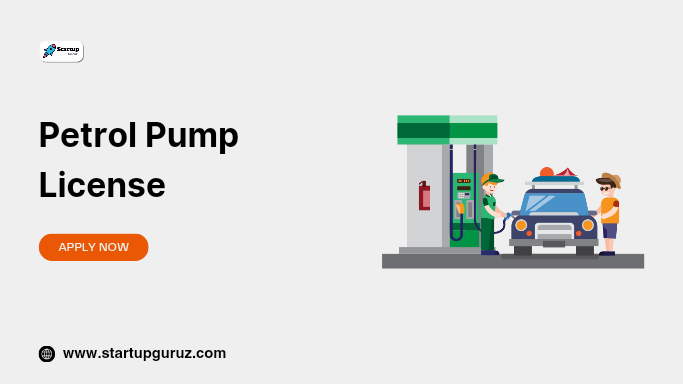Petrol Pump License
Introduction to Petrol Pump Licensing
Obtaining a petrol pump license in India is a crucial step for individuals or companies aspiring to venture into the petroleum retail business. The licensing process is regulated by the Petroleum and Explosives Safety Organisation (PESO) under the Ministry of Commerce and Industry.

Importance of Obtaining a Petrol Pump License
A petrol pump license is essential for legally operating a fuel retail outlet in India. It ensures compliance with safety standards, regulatory requirements, and environmental norms. Additionally, it provides access to a lucrative business opportunity in the petroleum industry.
Types of Petrol Pump Licenses in India
There are primarily two types of petrol pump licenses in India:
- Retail Outlet (RO) License: This license allows individuals or companies to sell petrol, diesel, and other petroleum products to end consumers.
- SKO-LDO Dealership: This license is specifically for selling superior kerosene oil (SKO) and light diesel oil (LDO) to eligible beneficiaries under government schemes.
Eligibility Criteria for Petrol Pump License
To be eligible for a petrol pump license in India, applicants must fulfill the following criteria:
- Indian citizenship or registered Indian company
- Adequate financial resources and investment capacity
- Suitable land or premises for setting up the petrol pump
- Compliance with safety, environmental, and zoning regulations
- No criminal record or history of violations related to petroleum or explosives laws
Documents Required for Petrol Pump License Application
The documents required for a petrol pump license application include:
- Proof of identity and address of the applicant(s)
- Land documents or lease agreement for the proposed petrol pump site
- No Objection Certificate (NOC) from the landowner and relevant authorities
- Environmental clearance certificate
- Fire safety certificate
- Financial statements and investment details
- Business plan and feasibility report
Step-by-Step Guide to Obtaining a Petrol Pump License
Follow these steps to obtain a petrol pump license in India:
- Research and identify suitable locations for setting up the petrol pump.
- Acquire or lease the land for the petrol pump site.
- Prepare the required documents and obtain necessary clearances and certificates.
- Submit the application for the petrol pump license to the relevant authorities, such as PESO or Oil Marketing Companies (OMCs).
- Pay the prescribed application fee and wait for the application to be processed.
- Undergo inspections and assessments by regulatory authorities.
- Upon approval, receive the petrol pump license and commence operations.
Compliance and Safety Regulations for Petrol Pumps
Petrol pump operators must adhere to various compliance and safety regulations, including:
- Storage and handling of petroleum products as per PESO guidelines
- Installation and maintenance of fire safety equipment
- Environmental protection measures, including spillage prevention and waste management
- Adherence to pricing and quality control regulations set by the government and OMCs
- Employee training on safety protocols and emergency procedures
Benefits of Having a Petrol Pump License
- Lucrative business opportunity with steady demand for fuel
- Revenue generation through sales commissions and ancillary services
- Brand association and support from Oil Marketing Companies (OMCs)
- Contribution to local economy and employment generation
- Potential for expansion and diversification into related businesses
FAQs on Petrol Pump Licensing
Q1: Can I apply for multiple petrol pump licenses? A1: Yes, subject to eligibility criteria and availability of suitable locations.
Q2: How long does it take to obtain a petrol pump license? A2: The licensing process can take several months, depending on the completeness of the application and regulatory approvals.
Q3: Can I transfer or sell my petrol pump license to another party? A3: Yes, with prior approval from regulatory authorities and compliance with transfer guidelines.
Q4: Are there any restrictions on the sale of additional products or services at petrol pumps? A4: Yes, additional products or services must be approved by the OMCs and comply with regulatory guidelines.
Q5: What are the financial requirements for setting up a petrol pump? A5: Financial requirements vary depending on factors such as land acquisition, infrastructure development, and working capital.
Q6: Can foreign nationals or companies apply for a petrol pump license in India? A6: No, petrol pump licenses are typically granted to Indian citizens or registered Indian companies.
Q7: Are there any tax benefits associated with operating a petrol pump? A7: Petrol pump operators may be eligible for certain tax benefits and incentives under government schemes.
Q8: What are the operational hours for petrol pumps? A8: Petrol pumps generally operate round the clock, but specific hours may vary based on location and local regulations.
Q9: Can I sell petroleum products from unlicensed sources at my petrol pump? A9: No, selling petroleum products from unlicensed sources is illegal and punishable under the law.
Q10: Is there a minimum distance requirement between petrol pumps? A10: Yes, there are minimum distance requirements between petrol pumps as per government regulations to prevent clustering and ensure fair competition.
Conclusion
Obtaining a petrol pump license in India is a complex yet rewarding process that offers significant business opportunities in the petroleum retail sector. By following the prescribed guidelines, fulfilling eligibility criteria, and adhering to safety and compliance regulations, aspiring petrol pump operators can navigate the licensing process successfully and embark on a fulfilling entrepreneurial journey in the fuel retail industry.